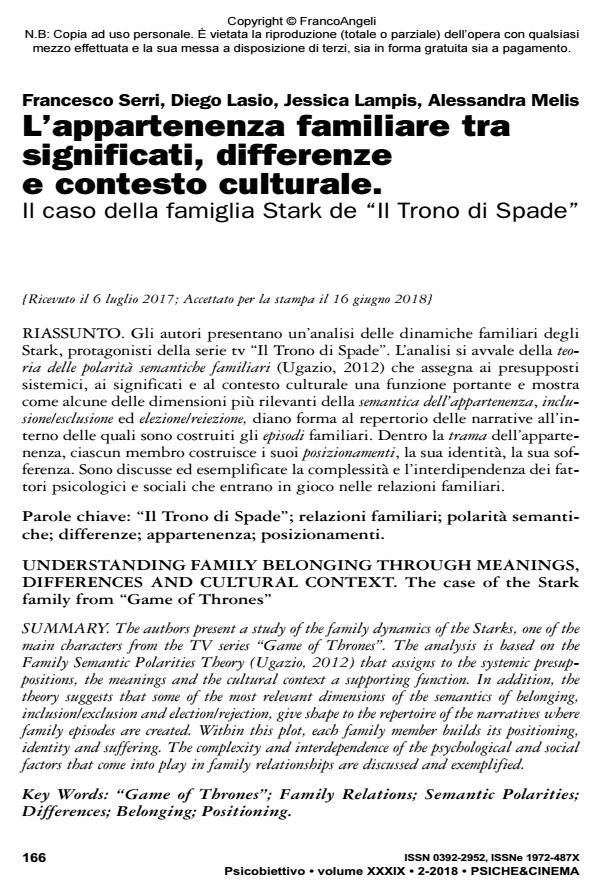L’appartenenza familiare tra significati, differenze e contesto culturale. Il caso della famiglia Stark de "Il Trono di Spade"
Titolo Rivista PSICOBIETTIVO
Autori/Curatori Francesco Serri, Diego Lasio, Jessica Lampis, Alessandra Melis
Anno di pubblicazione 2018 Fascicolo 2018/2
Lingua Italiano Numero pagine 9 P. 166-174 Dimensione file 113 KB
DOI 10.3280/PSOB2018-002012
Il DOI è il codice a barre della proprietà intellettuale: per saperne di più
clicca qui
Qui sotto puoi vedere in anteprima la prima pagina di questo articolo.
Se questo articolo ti interessa, lo puoi acquistare (e scaricare in formato pdf) seguendo le facili indicazioni per acquistare il download credit. Acquista Download Credits per scaricare questo Articolo in formato PDF

FrancoAngeli è membro della Publishers International Linking Association, Inc (PILA), associazione indipendente e non profit per facilitare (attraverso i servizi tecnologici implementati da CrossRef.org) l’accesso degli studiosi ai contenuti digitali nelle pubblicazioni professionali e scientifiche.
Gli autori presentano un’analisi delle dinamiche familiari degli Stark, protagonisti della serie tv "Il Trono di Spade". L’analisi si avvale della teo- ria delle polarità semantiche familiari (Ugazio, 2012) che assegna ai presupposti sistemici, ai significati e al contesto culturale una funzione portante e mostra come alcune delle dimensioni più rilevanti della semantica dell’appartenenza, inclu- sione/esclusione ed elezione/reiezione, diano forma al repertorio delle narrative all’in- terno delle quali sono costruiti gli episodi familiari. Dentro la trama dell’apparte- nenza, ciascun membro costruisce i suoi posizionamenti, la sua identità, la sua sof- ferenza. Sono discusse ed esemplificate la complessità e l’interdipendenza dei fat- tori psicologici e sociali che entrano in gioco nelle relazioni familiari.
Parole chiave:"Il Trono di Spade"; relazioni familiari; polarità semanti- che; differenze; appartenenza; posizionamenti.
Francesco Serri, Diego Lasio, Jessica Lampis, Alessandra Melis, L’appartenenza familiare tra significati, differenze e contesto culturale. Il caso della famiglia Stark de "Il Trono di Spade" in "PSICOBIETTIVO" 2/2018, pp 166-174, DOI: 10.3280/PSOB2018-002012